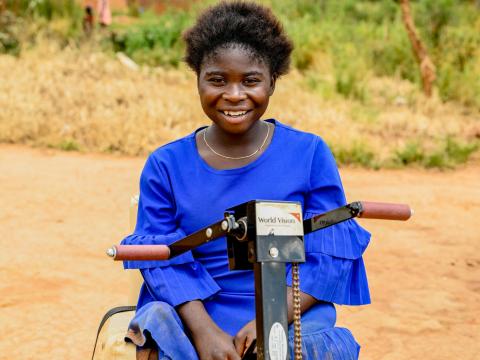DR Congo: Gloire's Journey - From the Dust to Dignity

Each morning, the first rays of sunlight brush across the tin roofs of Tshikala 2, a modest neighborhood in Lualaba Province, Democratic Republic of the Congo. Here, a figure draws every gaze: Gloire, 18, moving with dignity in her coffee-colored wheelchair, a gesture once unimaginable.
Born without the use of her legs, Gloire grew up with the ground as her only ally. Every movement was a brave act: crawling to the shower, to church, simply to exist. Her large, humble family surrounded her with love but lacked the means to improve her mobility. Though her father and seven siblings occasionally carried her, most of the time she moved under her strength on her knees.
Every morning, while her mother fried donuts for sale, Gloire would slide along the kitchen floor, then follow her mother to the market, every meter gained through sheer arm strength. Her palms hardened on the rough earth; during the rainy season, mud clung to her efforts. Despite pain and fatigue, Gloire refused to be defeated. Her ever-present smile hid the tears she sometimes shed in secret. At 18, her dream was simple: to move without injuring her hands and knees, to look people in the eye rather than from the dust.
Gloire found comfort in music and faith, singing in the church choir even when crawling or being carried. Her favorite Bible story was that of Daniel in the lion’s den, a symbol of hope that she too, would be delivered from her trial.
Her fate shifted the day hope knocked at her door. One morning, as she helped her mother, visitors arrived wearing World Vision vests. Her mother, wary at first, recalls:
“I was suspicious. We’ve seen people come with promises before... then nothing. Silence.”
The team explained they were part of World Vision’s Gift-In-Kind (GIK) program, distributing material donations, especially wheelchairs, to restore dignity and autonomy. Gloire’s mother could hardly believe it. Doubt melted away when a volunteer unloaded a brand-new wheelchair. Gloire and her mother exchanged stunned looks.
“Is this really for me?” Gloire whispered, gently touching the armrest.
With care, the team helped her into the chair and adjusted it to her size. For the first time, Gloire sat without touching the ground. A laugh escaped as she wheeled a few meters forward.
“This wheelchair isn’t just an object. It’s my freedom,” she said, eyes shining with tears.
In the days that followed, Gloire moved independently around her home and neighborhood. She now helps her mother sell donuts, greeting customers with clean hands and a confident smile.
“This wheelchair feels like someone grafted legs onto me. I’m no longer on the ground. I’m standing. I’m free.”
Her parents rejoiced. Her father, Jean, called it a blessing:
“I bless World Vision. This gift changed our lives. It’s not just an object; it’s an open door to the future.”
Freed from crawling, Gloire gained confidence. She engages with others, joins village conversations, fetches water, visits friends, and embraces her role as a big sister. The community, once astonished, now admires her. Every Sunday, she arrives at church in her finest dress, rolling down the aisle. Her voice in the choir is stronger than ever. One Sunday, the congregation held a special thanksgiving service. With a trembling voice, she shared her testimony:
“God showed me that even from my deepest weakness, I could be heard. Now, I want to be a voice for those no one sees.”
Today, Gloire dreams of continuing her education or learning a trade. Her disability, once a burden, has become a testimony of resilience and solidarity. Her faith is stronger than ever—like Daniel spared from the lions, she too feels delivered by grace.
The wheelchair is more than transport. It represents profound transformation and hope, not only for Gloire but for other children living with disabilities. Beyond wheels and metal, she carries restored dignity and the dream of a better life.